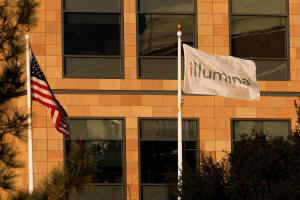Cancer researchers question antitrust arguments against Illumina-Grail
deal
 Send a link to a friend
Send a link to a friend
 [December 16, 2022]
By Deena Beasley and Julie Steenhuysen [December 16, 2022]
By Deena Beasley and Julie Steenhuysen
LOS ANGELES/CHICAGO (Reuters) - U.S. and European antitrust enforcers
want to unwind gene sequencing leader Illumina Inc's purchase of cancer
test company Grail, saying the two would stifle competition in a
critical area of medicine, but some cancer researchers say it's far too
early to make that assessment.
Illumina is the leading maker of high-speed genomic sequencing systems
that can examine fragments of DNA found in blood or other samples for
use in everything from solving crimes to drug research.
Antitrust regulators argue that Illumina, whose sequencers are being
used by companies, hospitals and research centers, could unfairly
prioritize Grail in the race to create tests for the early detection of
multiple types of cancer. Illumina could raise prices or withhold the
technology competing test developers need to thrive.
But Reuters interviews with 13 cancer researchers, genomics experts and
potential competitors to Grail and Illumina show the field of winners
and losers among early detection cancer test makers is still far from
decided, suggesting the $7.1 billion deal won't strengthen Grail's hand
as much as regulators fear.

In court documents, competition enforcers cite concerns from Grail
rivals about being disadvantaged by the tie-up.
Exact Sciences Corp and six other companies testified in the U.S. that
they relied on Illumina's system. The Illumina system is more advanced
than others and switching too costly, they said.
At the same time, Grail is the only company with a blood test designed
to detect multiple early-stage cancers on the market, giving it a
first-mover advantage with doctors prescribing the tests. However, it
does not have regulatory approval and likely needs a lot more data to
prove it works.
"The jury is still out," on which technology will dominate, said Dr.
Sadik Esener, director of the Cancer Early Detection Advanced Research
Center at the OHSU Knight Cancer Institute in Portland, Oregon. He added
it could take as long as 20 years to show that an early cancer detection
test saved lives.
The EU has ordered Illumina to sell Grail, a move the company plans to
appeal.
"While there is still uncertainty about the exact results of this
innovation race and the future shape of the market for early cancer
detection tests, protecting this current innovation competition is
crucial," an EU Commission spokesperson said.
The U.S. Federal Trade Commission has lost its case to stop the deal and
is appealing the decision. The FTC declined to comment. In court
documents, the agency said the deal, even in the early days of
competition before a clear commercial market is established, will
diminish innovation.

[to top of second column]
|

Flags wave in front of Illumina's global
headquarters in San Diego, California, U.S., November 28, 2022.
REUTERS/Mike Blake
 "Right now Grail is the only one on
the market. In antitrust, we tend to give outsized importance to the
one on the market," said Michael Carrier, who teaches antitrust law
at Rutgers Law School. Still, he noted "thoughts about their role
being diminished in the future is speculative."
Esener, who uses gene sequencing machines from Illumina and Pacific
Biosciences of California (PacBio) for research looking to detect
liver cancer in its earliest stages, noted the field of early cancer
detection is diverse, with about 30 companies working on five
different methods of testing for signs of very early cancer –
including the types Grail and its rivals are focused on.
If proven to work, early cancer detection tests
could help doctors identify cancer risk in patients long before
symptoms or other indicators develop.
DIFFERENT APPROACHES
Several of the leading contenders take vastly different approaches
to cancer detection and it is not yet clear which methods will prove
most useful or when. Large, lengthy clinical trials are also needed
to show the tests can benefit patients, experts say.
“All of the published data to date suggests promise, but nothing
more than that,” said Dr. Ernest Hawk at The University of Texas MD
Anderson Cancer Center.
Companies that make sequencing systems that compete with Illumina
include Thermo Fisher Scientific Inc, Ultima Genomics Inc and 10x
Genomics.
Each group pursuing a test uses a different approach. Grail's
Galleri test uses genetic sequencing and artificial intelligence to
scan blood samples for patterns of chemical changes associated with
specific cancers. Delfi Diagnostics Inc is using machine learning to
analyze cancer DNA in the blood and is focused on early detection of
only a handful of common cancers such as lung cancer. Guardant
Health has been working on a blood test to detect colorectal cancer
using a combination of DNA alterations and other biomarkers.

Other cancer test developers don't rely on gene sequencing at all.
Some are working on blood tests to detect different markers of early
cancer, including proteins.
Until evidence proves that early detection is viable, tests could
come and go, researchers said, with companies selling them to paying
patients while trials are ongoing.
(Reporting by Deena Beasley in Los Angeles and Julie Steenhuysen in
Chicago; additional reporting by Diane Bartz in Washington and Foo
Yun Chee in Brussels; editing by Caroline Humer and Chris Sanders)
[© 2022 Thomson Reuters. All rights
reserved.] This material may not be published,
broadcast, rewritten or redistributed.
Thompson Reuters is solely responsible for this content. |